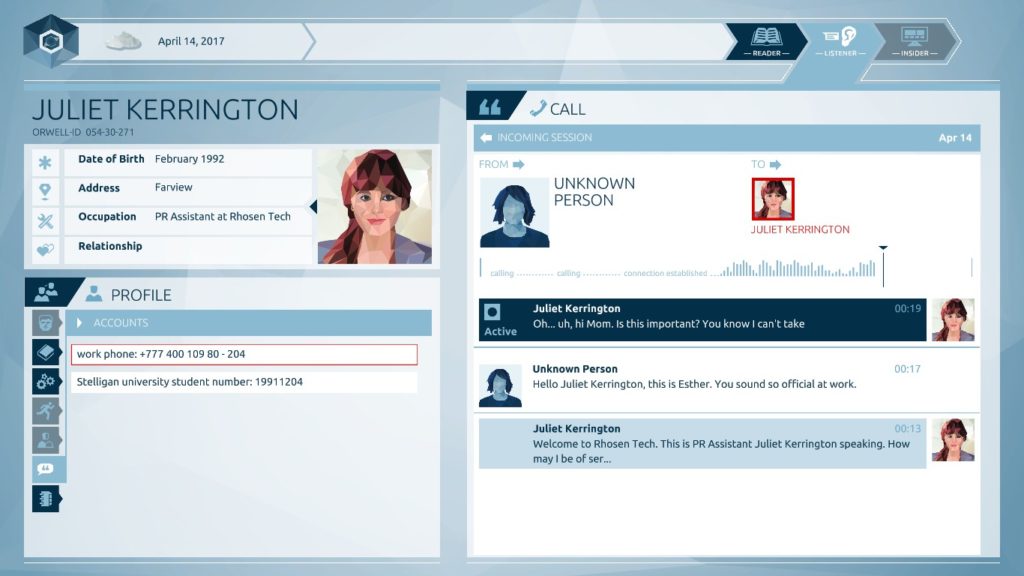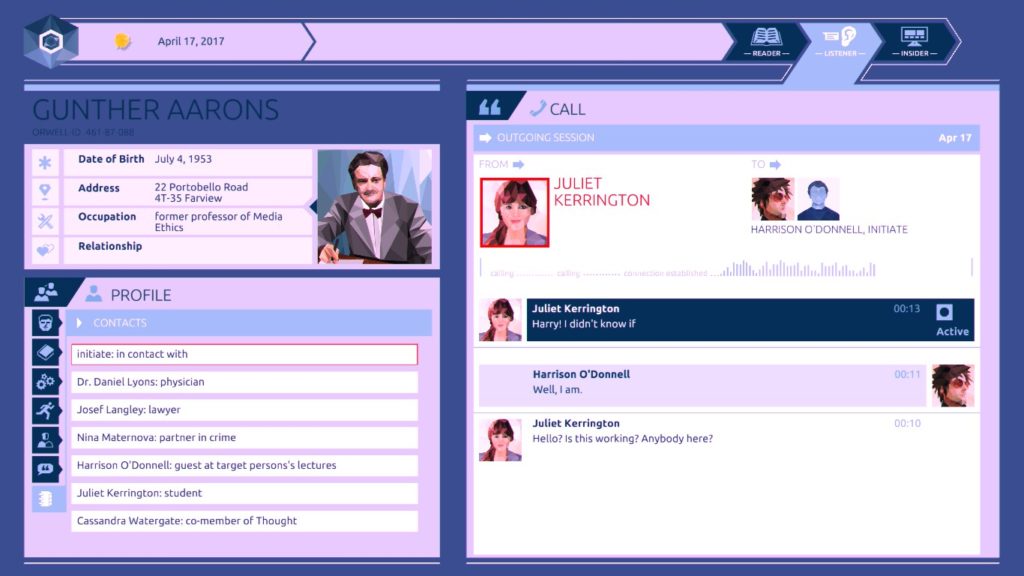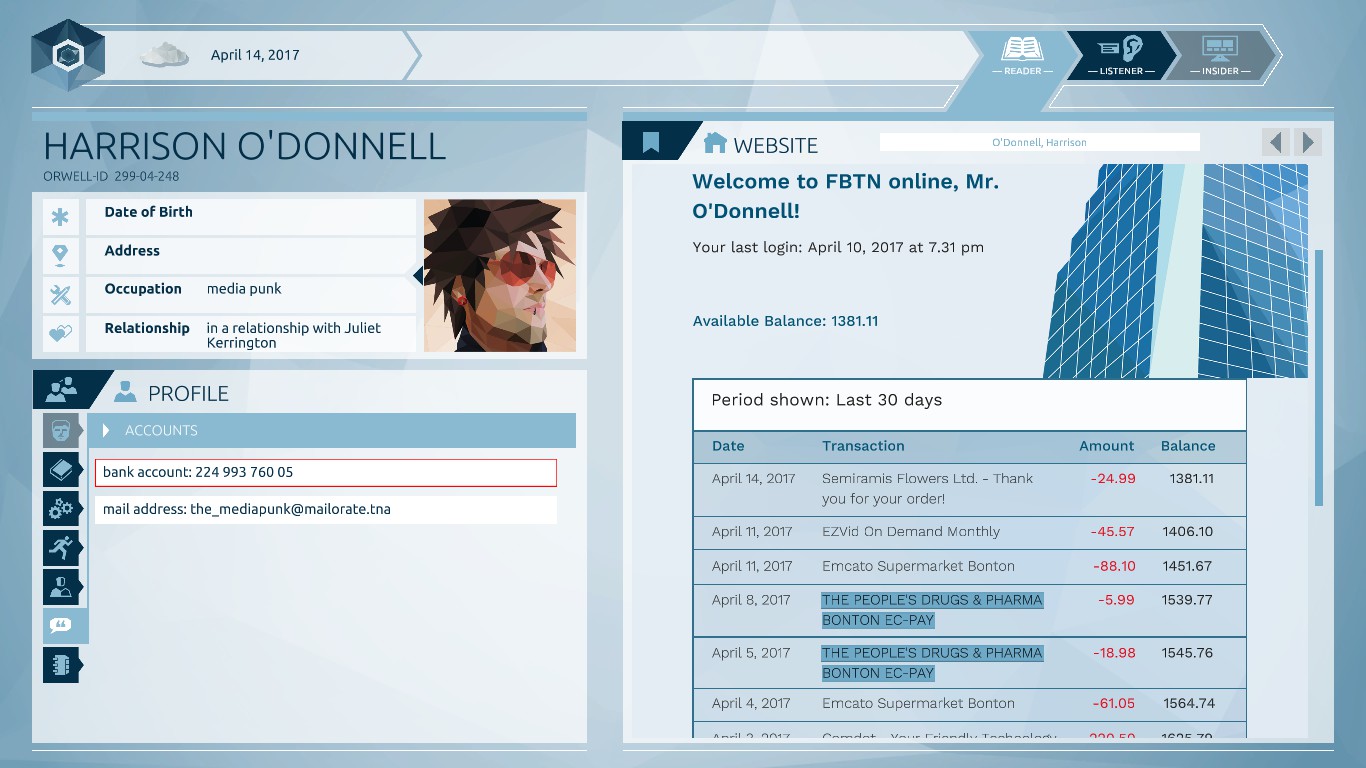In the dystopian future year of 2017, the Nation is going through a troubled time. The Party, which has run on a platform of reestablishing law and order, has rammed through the passage of the Safety Bill, an omnibus package of laws designed to expedite the arrest and prosecution of those deemed dangerous to society.
And not a moment too soon, it seems, as a bomb explosion on Freedom Plaza has killed innocent citizens. Therefore, the Party decides to roll out its latest and greatest tool in the fight against violent crime and terrorism. Of course, not everyone in the Nation would be terribly thrilled with the scope of the Party’s newest program, and it’s this clash between security and privacy that pulls the curtain back on today’s piece of the Big Steaming Pile, ORWELL: KEEPING AN EYE ON YOU.
Orwell puts you in command of an investigator subcontracted by the Nation to wield the power of Orwell, a top-secret program capable of monitoring virtually any form of electronic communication, from e-mails and chats to phone calls and even the contents of people’s personal devices. Your immediate task is to run down the lead you have on the perpetrator of the Freedom Plaza bombing and bring them and any accomplices to swift justice. To that end, you gather information and process it into profiles of target persons through the use of Datachunks, nuggets of information like occupations, web addresses, snippets of conversations, and pictures that shed light on the persons being investigated. What this means in practical terms is that Orwell plays rather like an old-school text adventure or interactive fiction title, which is a nice throwback if you’re old enough to remember when those genres were prevalent.
Since the game is very text-heavy and the gameplay largely comprised of drag-and-drop data mining, it’s imperative that the story be intriguing, and for the most part, it is, although something that’s sure to jump out at you very quickly is that the developers were very…heavy-handed, let’s say, in how they present the narrative. For example, the country you’re watching over and the political party ruling it are literally called “The Nation” and “The Party.” You’ll butt up against an activist group called “Thought.” The very first chapter of the game is titled “The Clocks Were Striking Thirteen.” Now, these kind of references probably won’t ruin your enjoyment of the game or the story, but there will probably be a couple of eye-rolling moments over the course of your investigation. Then again, you probably shouldn’t have expected much in the way of subtlety about such things when the game and the eponymous surveillance program are named for the author of 1984.

The other drawback you’ll probably notice with Orwell is that you don’t really feel as omniscient as you’re presented as being; in fact, the game at times feels extremely linear. For example, you’ll monitor a phone conversation between two subjects, and one of them will randomly mention the other’s instant messenger handle, which is convenient, but a little odd considering you would think friends would already have that information already without having to confirm it. Uploading certain Datachunks into the system will magically unlock new documents that just happen to contain the next piece of the puzzle you need. You really can’t freewheel around the internet running down tangential leads or searching for peripheral evidence; you’re more or less limited to a rather small number of sources, chasing a handful of possible suspects. While this does ensure you don’t really get stuck in any particular spot, and, to the game’s credit, the designers did kinda kayfabe around this by saying that Orwell investigators are legally bound to only dig into people officially declared targets, it would’ve been nice for there to be some possible dead ends or false flags to divert your attention.
This sort of feeling of going down corridors is compounded as the story unfolds. While certain events can resolve slightly differently as you progress, they don’t really feel like they’re affecting the grand scheme of things. For instance, you’ll have an arrest team sent out to bring a suspect in at one point, and while what you can uncover will decide whether your officers act more aggressively or more passively, either way, the suspect is getting taken down and basically removed from the story at that point; there’s no more interaction with that character. While you do get to make large, sweeping decisions in the final chapter of the game, and there are multiple endings available, it does feel a bit disingenuous when for the first 80% of the game, you’re led to believe you have a lot of control over the events leading up to it, when in reality, this isn’t really the case.
Another gimmick to this effect are yellow-highlighted Datachunks. Unlike the regular blue-highlighted Datachunks, which give you hard, concrete information, yellow ones suggest conflicting data somewhere else in the system, say, one Datachunk gives an alibi for a character and the other one pokes holes in the same alibi. You would think this would be an important feature for discerning guilt or innocence, and in its own way, it is, but it generally only applies to characters who are more on the fringe of the investigation; for the most part, important character X will be definitively proven to be at location Y at time Z without much in the way of deductive reasoning yourself.

I know I’ve made it sound like I didn’t enjoy this game, and playing through it was a collection of nagging disappointments, but what is here is still fairly enjoyable. As you progress through the game and learn more about the people involved in the case, you do learn enough about their personal lives and histories to sympathize with them or condemn them, depending on how you choose to view the information you uncover. For all the clumsiness and overly direct messaging in the story, the designers did an admirable job framing the “privacy vs. security” debate in an even-handed manner: with people legitimately being killed in the streets, is it worth the sacrifice of the privacy of a few, determined by an ostensibly neutral party, to protect the safety of the majority? The interface is very smooth and streamlined; you’re not bogged down trying to remember where everything you’re looking for is, so you can focus more on moving the story forward instead of searching for metaphorical Post-It notes scattered about. While there is very limited art in the game, the designers utilize a very polygonal, tessellated art style that balances well with the anesthetic Orwell motif, and the writing is competently done, considering a lot of it is attempting to emulate the way people communicate online.
Overall, Orwell: Keeping an Eye On You is a fairly respectable title and definitely feels like a modern evolution of the classic text adventure. The story, while not the most groundbreaking, is still told competently enough that you’re curious to see where the next bend in the road takes you, and the subject matter is very relevant in this day and age. The gameplay is straightforward, perhaps a little too much, but not quite to the point where you feel like your hand is being held the entire way. There are some aspects I would’ve like to have seen improved, and it’s possible that in the recently released sequel, Orwell: Igorance Is Strength, that those issues have been addressed, and it’s also possible that playing this game for review purposes made me more inclined to notice what’s missing than appreciate what’s here, because what’s here is still quite solid. I’d recommend it if you’re a fan of dystopian, um…Orwellian settings or the interactive fiction genre, or if you believe that just because you’re paranoid doesn’t mean they’re not really after you.
Current Price – $9.99
Is It Worth It? – If the setting or the genre appeals to you, yes, although you might want to buy the bundle with the sequel for a better value.
